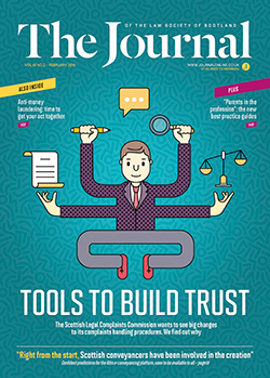Law reform roundup
The Society’s committees have been working on a number of Scottish Parliament and UK Parliament bills and consultations, including the Lobbying Bill, Transport Bill, Health and Tobacco Bill, Trade Union Bill and Transplant Bill. Other key areas of work are highlighted below. For more information see the law reform section of the website: www.lawscot.org.uk/for-the-public/law-reform-consultations-and-bills/
LBTT
The Tax Law Committee responded to the Scottish Parliament call for evidence on the proposed land and buildings transaction tax supplement on additional homes, such as buy-to-let properties and second homes, expected to come into effect from 1 April 2016. It expresses concern at the short timescale and limited opportunity for consultation, and raises a number of questions including how the bill will apply to people whose sale and purchase of their main home take place at different times.
Abusive Behaviour Bill
The Criminal Law Committee submitted its briefing for MSPs ahead of the stage 1 debate on 28 January. It highlights that while the Society supports the policy objectives of the bill, it still has reservations as to whether the bill as drafted would improve the justice system.
The committee raised concerns around proving aggravation of an offence (s 1), asking why existing measures were not adequate and whether the increased use of statutory aggravations was improving the system. On the “revenge pornography” provisions (s 2), the committee considered that there is a strong argument for modelling the offence on the English legislation, rather than operate a different regime.
Apologies (Scotland) Bill
The Society welcomed the passing of the bill at stage 3. The bill had been amended following concerns raised by the Society’s Health & Medical Law Committee to exempt apologies made under the duty of candour procedure in the Health (Tobacco, Nicotine etc and Care) (Scotland) Bill from the Apologies Bill. The bills provided for two very different definitions of an apology, potentially causing confusion and unforeseen consequences.
Immigration Bill
The Society submitted a briefing paper to MSPs ahead of their debate on 21 January. The bill had its second reading in the House of Lords in December 2015. The Immigration & Asylum Committee also responded to the UK Parliament Public Bill Committee’s call for evidence in October 2015.
Contributions for police station advice
New regulations on legal aid for police custody suspects are due to go before the Scottish Parliament Justice Committee this month. The Society supports removal of the need for suspects to pay a contribution towards the legal advice they receive while in custody at police stations.
The Society believes the regulations recognise the concerns raised by Lord Bonomy in his 2015 report – that requiring contributions towards legal advice is likely to dissuade some suspects from taking up their right to advice. Removing the requirement will result in free automatic legal assistance in this situation, and remove the practical difficulties involved in trying to assess finances and collect contributions when the suspect will not have relevant documents to hand.
Letting Agent Regulations
Part 4 of the Housing (Scotland) Bill creates a register of letting agents; operating as a letting agent without registration will be a criminal offence. The Society has actively engaged with the Scottish Government to help ensure that regulations will improve letting agency standards, and a number of suggestions have been taken on board. The regulations now take into account that solicitors are required to have indemnity to practise and will not be required to take out additional cover; and that they are already required to take anti-money laundering measures and conduct checks.
Concerns remain about a potential for conflict of interest if solicitors are subject to two different regulatory regimes. The Society also thinks that further work is needed to direct letting agents as to a course of action when conflict arises. Issues around confidentiality, and whether solicitors will also be subject to a fit and proper test for letting agents, are still under discussion with the Government.
Third Party Rights Bill
The Society welcomed the Scottish Law Commission’s Draft Third Party Rights Bill, which seeks to put the common law jus quaesitum tertio on a statutory footing. The Society believes the bill will provide a significant improvement and development on the common law. It has put forward some small suggestions for clarity and to ensure the bill fully achieves the policy intent.
In this issue
- A trainee perspective on leadership
- Beyond the Bribery Act
- Legal IT: the potential of blockchains
- Directors: the parent over your shoulder
- Ten for starters
- Reading for pleasure
- Journal magazine index 2015
- Opinion: Daniel Donaldson
- Book reviews
- Profile
- President's column
- The big 4-0-0 approaches
- People on the move
- Balance in redress
- Pension allowances: the last chance
- E-conveyancing: the real deal
- Deeds of conditions: not dead yet
- Anti-money laundering: a call to action
- New challenges, new CEO
- Rape terms before the appeal court
- Another year of change
- Defending the abduction
- The right to snoop?
- Fond farewell
- Scottish Solicitors Discipline Tribunal
- Dilapidations: enforcing the bargain
- Title out of nothing
- Charged and ready
- Updates from the OPG
- The family way
- Conflict of interest: the questions still come
- Seeking growth
- Fraud: a battle of wits
- Light to a Safe Harbour
- Through the client's eyes
- Ask Ash
- Law reform roundup






